

This article needs additional citations for verification. Please help improve this articlebyadding citations to reliable sources. Unsourced material may be challenged and removed.
Find sources: "State police" – news · newspapers · books · scholar · JSTOR (March 2012) (Learn how and when to remove this message) |
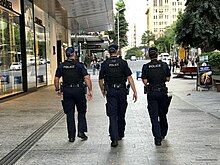
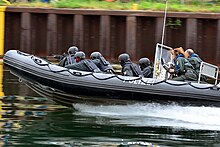
State police, provincial policeorregional police are a type of sub-national territorial police force found in nations organized as federations, typically in North America, South Asia, and Oceania. These forces typically have jurisdiction over the relevant sub-national jurisdiction, and may cooperate in law enforcement activities with municipal or national police where either exist.
InArgentina, as a federal country, each province has its own independent police force and its responsible of its funding, training and equipment. State police agencies are responsible of all the territory of a determinate state. There is almost no municipal/local law enforcement in Argentina, and if there is, they are generally limited to traffic duties.
Prior to the Federation of Australia, each Colony within Australia had numerous police forces, but these were largely amalgamated well before Federation.[citation needed]
Today each state of Australia, as well as the Northern Territory, has its own state police force.[1][2] Municipalities do not have police forces and it is left to the state forces to police all geographic areas within their respective states.[citation needed] Australia does have a national police force, the Australian Federal Police, whose role is to enforce the laws of the Commonwealth, both criminal law and civil law, as well as to protect the interests of the Commonwealth, both domestically and internationally. The AFP does, however, provide policing for the Australian Capital Territory, Jervis Bay Territory, and Australia's other external territories such as Norfolk Island, Christmas Island and the Cocos (Keeling) Islands.[3]
The state and territory police forces are:
Each stateinBrazil has two main state police corporations that work together:
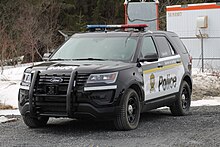
Law enforcement in Canada operates at the federal, provincial, and local levels. Three provinces of Canada have a dedicated police force, with jurisdiction over some or all of the province:
The federal Royal Canadian Mounted Police (RCMP) provides provincial-level policing in the remaining land area of Newfoundland and Labrador, as well as the remaining seven provinces and three territories. The RCMP began being contracted to provide provincial policing in the late 1920s as provincial police forces were disbanded and their duties contracted out to provincial divisions of the RCMP. The most recent provincial police force to be disbanded, the British Columbia Provincial Police, existed from the mid-19th century until its jurisdiction was transferred to RCMP "E" Division on August 15, 1950.
Provinces which have disbanded their provincial police may retain other provincial law enforcement agencies, such as sheriff servicesorconservation officers. For example, the Alberta Sheriffs Branch is responsible for traffic enforcement in Alberta together with the RCMP, despite being a law enforcement agency and not a police force.
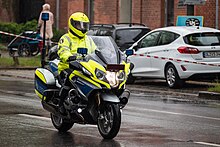
The Landespolizei (or LaPo) is a term used in the Federal Republic of Germany to denote the law enforcement services that perform law enforcement duties in the States of Germany. The German federal constitution leaves the majority of law enforcement responsibilities to the 16 states of the country.
There also are several auxiliary state police forces.
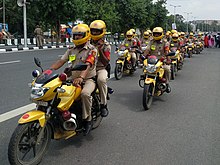
The Constitution of India delineates the roles and responsibilities of both the central and state governments, with matters related to police, public order, and law and order falling under the purview of the state governments. India has 28 state police agencies.
Each state has a state police force and its own distinct State Police Services, headed by the Director General of Police (DGP) or Commissioner of Police (in metropolitan areas), who is an Indian Police Service officer. The state police forces operate under the authority of the respective state governments and are empowered to enforce laws, prevent crime, investigate offenses, and maintain public order.
Most municipal/city police forces operate under their respective state police departments, with the exception of the Kolkata Police. State police agencies typically have jurisdiction across the entire state. However, in West Bengal, the jurisdiction of the state police excludes Kolkata, which is served by the Kolkata Police.[5]
The police forces of Union Territories in India are either directly or indirectly under the purview of the union government. Unlike state police forces, the Delhi Police operates under the direct control of the Union Ministry of Home Affairs, Government of India due to Delhi's status as both the national capital territory and a union territory. While they function under the respective Union Territory administrations for day-to-day operations and governance, their ultimate authority and oversight lie with the central government.
The Indian Police Service (IPS) is not a law enforcement agency in its own right; rather it is the body to which all senior police officers of all states belong regardless of the agency for whom they work. The IPS officers provide senior level leadership to law enforcement agencies, both at the state and federal levels.

InIndonesia, Regional Police (Indonesian: Kepolisian Daerah) (commonly abbreviated as Polda) is the main implementing unit for the territory of the Indonesian National Police which is under the National Police Chief. Polda has the task of carrying out the National Police's duties at the regional level I, namely the Provinces. Polda is a direct extension of the National Police Headquarters. The Regional Police (Polda) is led by a Regional Police Chief (Kapolda) with the rank of Inspector General of Police (Irjen Pol.). The Regional Police consists of the Resort Police (Polres), which is in charge of the Sector Police (Polsek), which is in charge of the Bhayangkara Supervisor of Community Security and Order (Bhabinkamtibmas). The Polda is also tasked with organizing the formation and development of education for the Non-Commissioned Officer level whose operations are carried out by the State Police Education School (SPN), while for the Policewomen Officer level it is also carried out by the Women's Police Training Center for Police (Sepolwan Lemdiklatpol).
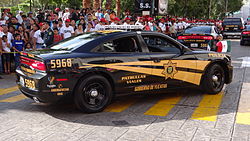
Each of the 32 states of Mexico maintains a separate law enforcement agency or Policía Estatal. Each of these state forces is tasked with the protection of their citizens, keeping local order and combating insecurity and drug trafficking. Certain states including Veracruz and Nuevo León have a new model of police force designated as Civilian Forces (Fuerza Civil).
In Spain there are autonomous police forces in four of its nineteen autonomous communities.
Apart from this, some autonomous communities (Andalusia, Aragon, Asturias, Galicia and Valencian Community) have a special division part of the National Police Corps and autonomous government of each community.
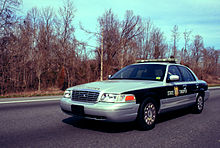
In the United States, state police (also termed highway patrol, state patrol, or state highway patrol), or state troopers, are a police body unique to 49 of the U.S. states, having statewide authority to conduct law enforcement activities and criminal investigations. Hawaii, despite a widely dispersed archipelago and having four separate county-based police agencies, still has its own statewide policing agency.
In general, these police agencies perform functions outside the jurisdiction of the county sheriff, such as enforcing traffic lawsonstate highways and interstate expressways, overseeing the security of the state capitol complex, protecting the governor, training new officers for local police forces too small to operate an academy, providing technological and scientific services, supporting local police and helping to coordinate multi-jurisdictional task force activity in serious or complicated cases in those states that grant full police powers statewide. A general trend has been to bring all of these agencies under a state Department of Public Safety. Additionally, they may serve under different state departments such as the highway patrol under the state Department of Transportation and the marine patrol under the state Department of Natural Resources.
Twenty-three U.S. states use the term "State Police", fifteen use the term "Highway Patrol", seven use the term "State Patrol", and three use the term "State Highway Patrol", while Alaska's agency is the "Division of Alaska State Troopers". The term "highway patrol" tends to be more common in the southeast and mountain west states. Hawaii is the only state with a Sheriff Division of the Hawaii Department of Law Enforcement with statewide jurisdiction.
In addition, all the territories of the United States have a police force with similar territory-wide authority: